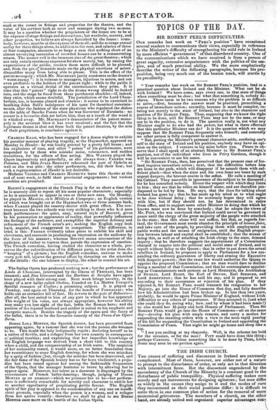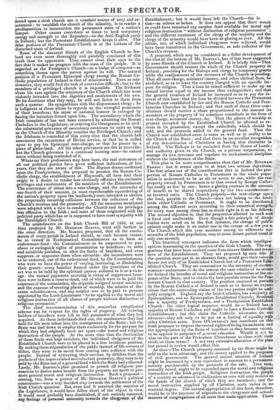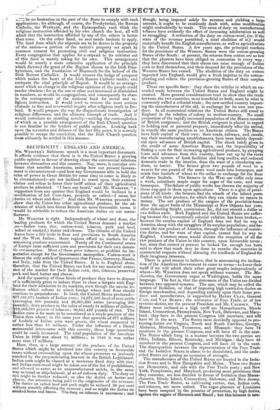THE IRISH CHURCH.
THE causes of suffering and discontent in Ireland are extremely complicated. Most of them, however, are either not of a nature to prompt to the disturbance of order, or only act in that direction with intermittent force. But the discontent engendered by the ascendancy of the Church of the Minority is a constant goad to the disturbance of public tranquillity. Physical suffering makes men moody and apt instruments for designing agitators ; but men differ as widely in the causes they assign to it and the modes of cure they recommend as their social positions differ : it is difficult to unite thorn in one common plan of action for the removal of mere economical grievances. The members of a church, on the other hand, are already united and organized: superior advantages con.
(erred upon a rival church are a constant source of envy and re- sentment : to establish the church of the minority, is to render a predisposition to insurrection the permanent state of a nation's temper. Other causes contribute at times to lend temporary energy and strength to the Repealers—to the Anti-English party in Ireland; but the Protestant Establishment keeps it alive. The false position of the Protestant Church is at the bottom of the disturbed state of Ireland.
Some of the sincerest friends of the English Church in Ire- land are even more thoroughly and painfully convinced of this truth than its opponents. They cannot close their eyes to the fact that it makes no progress with the mass of the people. It is regarded as the Foreigner's Church—as a badge of conquest—as something thrust upon the nation against its will. The natural position of a Protestant Episcopal clergy among the Roman Ca- tholic population of Ireland is that of missionaries. Even as mis- sionaries, they would find the task of conversion difficult ; but to the members of a privileged church it is impossible. The Irishman shuts his ears against the ministers of the Church which has been violently intruded into the dignities and emoluments of his own. Be its doctrines what they may, he will not listen to them from such a quarter. He sympathizes with the dispossessed clergy ; he is indignant at those whom he regards as the wrongful possessors of their benefices; his sense of national honour is outraged by having the intruders forced upon him. The ascendancy which the Irish complain of has not been removed by admitting the Roman Catholics to the Legislature, or ordering the Orangemen to be civil: the substantial grievance of ascendancy continues to exist so long as the Church of the Minority remains the Privileged Church ; and the Irishman is reminded of this every time that the church-bell announces the recurrence of Divine service, or that he is called upon to pay his Episcopal rent-charge, or that he passes by a piece of glebe-land. AU his other grievances are felt at intervals; but the Church grievance is a continual burning sore—he cannot move without being reminded of it. Whatever their professions may have been, the real statesmen of all our political parties have given sufficient indications, of late _years, that they are aware of this. The Regiuin donum conferred upon the Presbyterians, the proposal to pension the Roman Ca- tholic clergy, the establishment of Maynooth, all have had their origin in a desire to render less obviously offensive the exclusive privileges and emoluments of the ministers of the Establishment. The conversion of tithes into a rent-charge, and the surrender of one-fourth of their amount, (a most reprehensible squandering of the nation's property upon the landlords,) were intended to obviate the perpetually recurring collisions between the collectors of the Church's revenue and the peasantry. All the measures mentioned were adopted with a view to render the Church and its privileges
less offensive to the Irish ; and most of them originated with the .political party which has or is supposed to have most sympathy with the Establirslbed Church.
The amendments on the Irish Church Bill of 1835, at one time proposed by Mr. BINGHAM BARING, went still further in the same direction. Mr. BARING proposed, that all the emolu- ments of every parish in Ireland should, as each became vacant, be so vested in Ecclesiastical Commissioners as to form an endowment-fund : the Commissioners to be empowered to pur- chase or extinguish rights of presentation to benefices ; to unite and subdivide parishes, to alter the limits of benefices, and even suppress or sequester them when advisable : the incumbents were to be endowed, out of the endowment-fund, by the Commissioners, who were to have the power of varying, increasing, or diminishing their grants : every benefice formed under the provisions of the act was to be held by the spiritual person collated to it as a vicar- age : the annual payments accruing in virtue of suppressed bene- fices were to form a reserve-fund, out of which were to be paid the expenses of the commission, the stipends assigned to new ministers, and the expense of erecting places of worship, the salaries of dio- -cesan schoolmasters, and any surplus was to be paid to persons appointed by the Lord-Lieutenant "to be applied to the moral and religious instruction of all classes of people without distinction of _religious persuasion."
The chief recommendation of this somewhat complicated scheme was its respect for the rights of property. All existing holders of benefices were left in full possession of what they had acquired. As these individuals died out, the emoluments they had held for life were taken into the management of the State ; but the State was tied down to employ them exclusively for the purpose for which they had originally been set apart—the moral and religious instruction of the people. At the same time that the destination of these funds was kept inviolate, the individual clergymen of the Established Church were to be placed in a less invidious position. By making them stipendiaries of the public instead of life-owners of tithes, they were to be saved from coming into collision with the people. Instead of extracting their revenue by driblets from the pockets of the impoverished and reluctant peasantry, they were to be paid by the State out of a general fund which the State had collected. Lastly, Mr. Ilsanc's plan promised to permit all religious per- suasions to derive some benefit from the property set apart to pro- mote general moral and religious instruction. Such a proposal— .coming, too, from a person of Mr. BINGHAM BARING 8 political connexions—was a very decided step towards the settlement of the Irish Church question. But, even had it received the sanction of the Legislature, it would have fallen short of the object in view. It would most probably have diminished, if not entirely removed, July feelings of personal animosity towards the clergymen of the
Establishment ; but it would have left the Church—the in
Lion—as odious as before. It does not appear that there woutu or could have remained any surplus fund available for moral and
religious instruction " without distinction of religious persuasion";
and the different treatment of the clergy of the majority and the clergy of the minority would have been as glaring as ever. All the odium, too, of which individual clergymen were relieved, would have been transferred to the Government, as sole collector of the Church's revenue.
A proposal, which may be considered as a fuller development of the idea at the bottom of Mr. BARING s, has of late been suggested by some friends of the Church in Ireland. It is briefly this—That Government should resume the whole of the Church property in Ireland ; providing for the Bishops and clergy by temporary grants while the readjustment of the revenues of the Church is pending. That all rent-charge, ministers'-money, and other clerical dues, be abolished, so as to leave the country charged with no specific im- post for religion. That a loan be raised sufficient to make up an annual income equal to the income thus extinguished ; and that the general taxation of Ireland be increased so as to pay the in- terest of this loan : that the loan be divided between the Protestant Church now established by law and the Roman Catholic and Pres- byterian Churches in Ireland ; and that each of these three com- munions should receive a share proportioned to the amount its members or the property of its members contribute in the form of rent-charge, ministers'-money, &c. That the places of worship at present occupied by the Established Church be allowed to re- main in its possession, except the cathedrals, which should be sold, and the proceeds added to the general fund. That the Church now established cease in name as well as in reality to be the Church of the State ; and that there be no peculiar recognition of any denomination of Christians as having that charaater in Ireland. The Bishops to be excluded from the House of Lords ; and authority given to the Church, as a private corporation, to manage its own revenues and regulate its ecclesiastical discipline without the interference of the State.
This plan is far more comprehensive than that of Mr. BINGHAM BARING : but it seems open to at least two serious objections. The first arises out of the consideration that in Ireland the pros portion of Roman Catholics to Protestants in the whole popu- lation is understood to be as six or seven to one, while the real; property owned by Protestants is to that owned by Roman Catho- lics nearly as five to one : hence a glaring contrast in the amoun: of benefit to be shared respectively by the two comnlfluions- an inverted ratio. The Church property—the rent-charge upo the land, payable to the Church—does not belong to the land- lords either Catholic or Protestant. It ought to be distribute*. among the different sects according to their numerical strength, for every man among them has as much right in it as his fellows. The second objection is, that the proportion allotted to each seat is fixed and unalterable. Even though a fair principle of distr. bution were acted on in the first instance, the change of public opinion might make it an unfair one in the course of a few yea a. The Church which this year numbers among its adherents set- sevenths of the Irish population, may at some future period numl. ar only one-seventh.
This historical retrospect indicates the form which intelligeni opinion is assuming on the question of the Irish Chureh. The seg• gestions that have been noticed come from sincere friends and mem- bers of the Establishment. They are proposed by men who if the question were put in an abstract form, would give their voice in favour not only of an Established Church but of a Protestant Esta- blished Church. They are concessions to the necessity of circum- stances=endeavours to do the utmost the case admits of to secure for Ireland the benefits of moral and religious instruction at the ex- pense of the State, and to obtain the best possible terms for the Pro- testant Church in that country. The position assumed at present by the Roman Catholics of Ireland is such as to favour an expec- tation that the contending claims of the two parties might be i.mi- cably arranged. England, say the Irish Catholics, has a majority of Episcopalians, and an Episcopalian Established Church ; Scotland has a majority of Presbyterians, and a Presbyterian Established Church: the strict logical sequence would be—Ireland has a majority of Roman Catholics, and ought to have a Roman Catholic Establishment ; but this claim the Catholic advocates do not advance—they ask only to be put on a footing' of equality with other Christian sects. Even O'Conazi.e's last manifesto on this head proposes to respect the vested rights of living incumbents, and the appropriation by the State of benefices as they become vacant, to be applied to purposes of general education. Would it not be wise on the part of the Protestant Churchmen to close with 'their rivals on these terms ? A not very extensive alteration of the plan last passed in review would effect this.
As thus—The Church property resumed by the State might be sold to the best advantage, and the money applied to the purposes of civil government. The general annual taxation of Ireland might be increased by a sum equivalent in amount to a pernianent annuity purchaseable by the proceeds of the sale. fhis sum, annually raised, ought to be expended upon the moral and religious instruction of the Irish people. Religious instruction the people of a country so advanced in civilization as ours will only receive at the hands of the church of which they are members; and the moral instruction supplied by all Christian sects varies in no material degree. The natural appropriation of this fund, therefore, would be to the payment of stipends to the clergymen and school- masters of congregations of all sects that made application. There
be no hesitation on the part of the State to comply with such applications ; for although, of course, the Presbyterian, the Roman Catholic, the Wesleyan, and the Episcopalian, each think the religious instruction afforded by his own church the best, all will admit that the instruction afforded by any of the others is better than none. On the other hand, no sect needs hesitate to apply. The fund from which the stipends are to be drawn is the property of the nation—a portion of the nation's property set apart by common consent for promoting civil and religious instruction. Every congregation that applies for a stipend to its minister out of this fund is merely asking for its own. This arrangement would be merely a more extensive application of the principle which dictated the grant of the Regium donum to the Irish Pres- byterians, and the foundation of Maynooth for the behoof of the Irish Roman Catholics. It would remove the badge of conquest which makes the heart of the Irish Roman Catholic rankle, and extirpate the vital principle of Repeal. It would be an arrange- ment which no change in the religious opinions of the people could render obsolete ; for as the one or other sect increased or diminished in numbers, so would its congregations, and consequently its share in the management of the national fund for moral and re- ligious instruction. It would tend to remove the most serious obstacle to free and reverential inquiry after religious truth in Ire- land. It would prepare the way for dispassionate investigation of religious differences, and the ultimate triumph of truth. And it would introduce no startling novelty—nothing the contemplation of which as a possible arrangement of the Irish Church question is not familiar to the leaders of public opinion. Looking back upon the measures and debates of the last fifty years, it is scarcely possible to escape the conviction, that the Irish Church question must ultimately be settled in this manner.




























 Previous page
Previous page